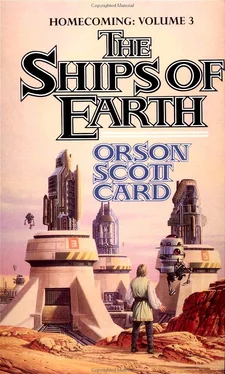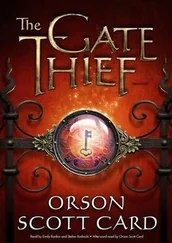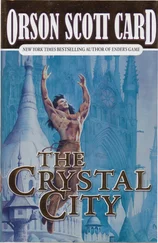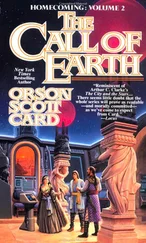Orson Card - THE SHIPS OF EARTH
Здесь есть возможность читать онлайн «Orson Card - THE SHIPS OF EARTH» весь текст электронной книги совершенно бесплатно (целиком полную версию без сокращений). В некоторых случаях можно слушать аудио, скачать через торрент в формате fb2 и присутствует краткое содержание. Жанр: Фантастика и фэнтези, на английском языке. Описание произведения, (предисловие) а так же отзывы посетителей доступны на портале библиотеки ЛибКат.
- Название:THE SHIPS OF EARTH
- Автор:
- Жанр:
- Год:неизвестен
- ISBN:нет данных
- Рейтинг книги:4 / 5. Голосов: 1
-
Избранное:Добавить в избранное
- Отзывы:
-
Ваша оценка:
- 80
- 1
- 2
- 3
- 4
- 5
THE SHIPS OF EARTH: краткое содержание, описание и аннотация
Предлагаем к чтению аннотацию, описание, краткое содержание или предисловие (зависит от того, что написал сам автор книги «THE SHIPS OF EARTH»). Если вы не нашли необходимую информацию о книге — напишите в комментариях, мы постараемся отыскать её.
THE SHIPS OF EARTH — читать онлайн бесплатно полную книгу (весь текст) целиком
Ниже представлен текст книги, разбитый по страницам. Система сохранения места последней прочитанной страницы, позволяет с удобством читать онлайн бесплатно книгу «THE SHIPS OF EARTH», без необходимости каждый раз заново искать на чём Вы остановились. Поставьте закладку, и сможете в любой момент перейти на страницу, на которой закончили чтение.
Интервал:
Закладка:
"Please shut up," said Luet. "I don't want to be cheered up, I want my baby to be a ten-year-old child already so that I remember all of this as an amusing event from my childhood long ago."
"Your wish is granted," said Nafai. "The baby is here and aged ten. Of course, she's incredibly obnoxious and bratty, the way you were at ten."
"I wasn't."
"You were the waterseer already, and we all knew you bossed and sassed grownups all the time."
"I told them what I saw, that's all!" Then she realized that he was laughing. "Don't tease me, Nafai. I know I'd be sorry later, but I still may lose control and kill you now."
He gathered her into his arms and she had to twist away to keep him from kissing her. "Don't!" she said. "I've got the most awful taste in my mouth, it would probably kill you!"
So he held her and after a while she felt better.
"I think about Keeper of Earth all the time," said Nafai.
I would, too, if I weren't thinking about the baby, Luet said silently.
"I keep thinking that maybe it isn't just another computer," said Nafai. "That maybe it isn't calling us through hundred-year-old dreams, that maybe it knows us, and that it's just waiting for ... for something before it speaks to me."
"It's waiting for the message that only you can receive."
"I don't care," said Nafai. "About it being only me. I'd take Father's dream, if only I could experience what it feels like inside my head. How the Keeper is different from what the Oversoul does inside me. I want to know."
I know you do. You keep coming back to it, day after day.
"I've been trying to talk to the Keeper of Earth. That's how crazy I'm getting, Luet. Show me what you showed Father! I say it over and over."
"And she ignores you."
"It's a hundred light-years away!" said Nafai. "It doesn't know I exist!"
"Well if all you want is the same dream as Volemak, why not get the Oversoul to give it to you?"
"It isn't from the Oversoul."
"But she must have recorded the whole experience inside your father's mind, right? And she can retrieve it, and show it to you. And the way you get everything so much more clearly through the Index –"
"Just like experiencing it myself," said Nafai. "I can't believe I never thought of that. I can't believe the Oversoul never thought of that."
"She's not very creative, you know that."
"She's creatively inert," said Nafai. "But you're not." He kissed her on the cheek, gave her one last hug, and bounded to his feet. "I have to go talk to the Oversoul."
"Give her my love," said Luet mildly.
"I—oh, I see. I can wait—let's walk back together."
"No, really—I wasn't hinting. I want to stay here a while longer. Maybe just to see if they let Yobar back."
"Don't miss supper," said Nafai. "You're eating for –"
"Two," said Luet.
"Maybe three!" said Nafai. "Who knows?"
She groaned theatrically, knowing that was what he wanted to hear. Then he ran off, back up the valley toward the camp.
He really is just a boy, as Aunt Rasa said. But what am I? His mother now? Not really— she's his mother. I shouldn't expect more of him—he works hard and well, and more than half the meat we eat is from his hunting. And he's kind and gentle with me—I don't know how Issib could be any sweeter and more tender than Nafai, no matter what Shuya says. And I'm his friend—he comes to me to talk about things that he says to no one else, and when I want to talk he listens and answers, unlike some of the other husbands, or so their wives say. By any standard I ever heard of, he's a fine husband, and mature beyond his years—but it isn't what I thought it was going to be. When I took him through the Lake of Women, I thought it meant that he and I were going to do great and majestic things together. I thought we would be like a king and a queen, or at least like a great priestess and her priest, doing powerful and majestic things to change the universe. Instead I throw up a lot and he bounds around like a fifteen-year-old who is really hurt because some computer from another planet won't send dreams to him…
Oh, I'm too tired to think. Too sick to care. Maybe someday my image of our marriage will come true. Or maybe that'll be his second wife, after I puke to death and get buried in the sand.
Shedemei had spent her whole life knowing that people looked at her oddly. At first it was because she was so intelligent as a child, because she cared about things that children weren't supposed to care about. Adults would look at her strangely. So would other children, but sometimes the adults smiled and nodded their approval, while the children never did. Shedemei had thought this meant that when she was an adult, she would be fully accepted by everyone, but instead the opposite was true. When she became an adult it only meant that all the other adult were the same age now and treated her as the children had. Of course, now she was able to recognize what she was seeing. It was fear. It was resentment. It was envy.
Envy! Could she help it that she had been given a combination of genes that gave her an extraordinary memory, an enormous capacity for grasping and understanding ideas, and a mind that was able to make connections that no one else could see? It's not as if she chose to be able to do mental gymnastics beyond the reach of anyone she had ever met in person. (There were people just as intelligent as she, and some perhaps more intelligent, but they were in far cities, even on other continents, and she knew of them only through their published works, distributed by the Oversoul from city to city.) She had no malicious intent. She certainly didn't have the ability to share her ability with the envious ones—she could only share the products of her ability. They gladly took those, and then resented her for being able to produce them.
Most human beings, she concluded long ago, love to worship from afar people with extraordinary ability, but prefer to have their friends be genial incompetents. And, of course, most of them get their preference.
But now she was permanently attached to this little society of sixteen people, and unable to avoid meeting them day by day. She did her work—her time weeding in the garden, her water turn, her hours of baboon-watching during the day to make sure they didn't leave their area and get into the food. She gladly covered for Luet when she was throwing up, and uncomplainingly did the tasks that Sevet was too lazy and Kokor too pregnant and Dol just generally too precious a being to do, Yet still she did not fit, was not accepted, was not part of the group, and it only got worse, day by day.
It didn't help a bit that she understood exactly what was happening. The bonding between husband and wife triggers a need for others also to be bonded in the same pattern, she knew that, she had studied it. The old courtship patterns, the loose and easy friendships, those now make the married ones feel uneasy, because they don't want anything around them that threatens the stability of the monogamous marriage bond, while the essence of unmarried society is always to be off balance, always to be free and random and unconnected and playful.
Admittedly, that was precisely the way some of them still wished to behave—Shedemei could see how monogamy chafed at Mebbekew and Obring, Sevet and Kokor. But they were acting the role of spouse right now, perhaps even more aggressively than the ones who actually meant it. In any event, the result was that Shedemei was even more cut off from others around her than she had ever been before. Not that she was shunned. Hushidh and Luet were as warm to her as ever, and Eiadh in her way was decent, while Aunt Rasa was utterly unchanged—she would never change. However, the men were all universally… what, civil? And Dol's, Sevet's, and Kokor's attitudes ranged from ice to acid.
Читать дальшеИнтервал:
Закладка:
Похожие книги на «THE SHIPS OF EARTH»
Представляем Вашему вниманию похожие книги на «THE SHIPS OF EARTH» списком для выбора. Мы отобрали схожую по названию и смыслу литературу в надежде предоставить читателям больше вариантов отыскать новые, интересные, ещё непрочитанные произведения.
Обсуждение, отзывы о книге «THE SHIPS OF EARTH» и просто собственные мнения читателей. Оставьте ваши комментарии, напишите, что Вы думаете о произведении, его смысле или главных героях. Укажите что конкретно понравилось, а что нет, и почему Вы так считаете.









